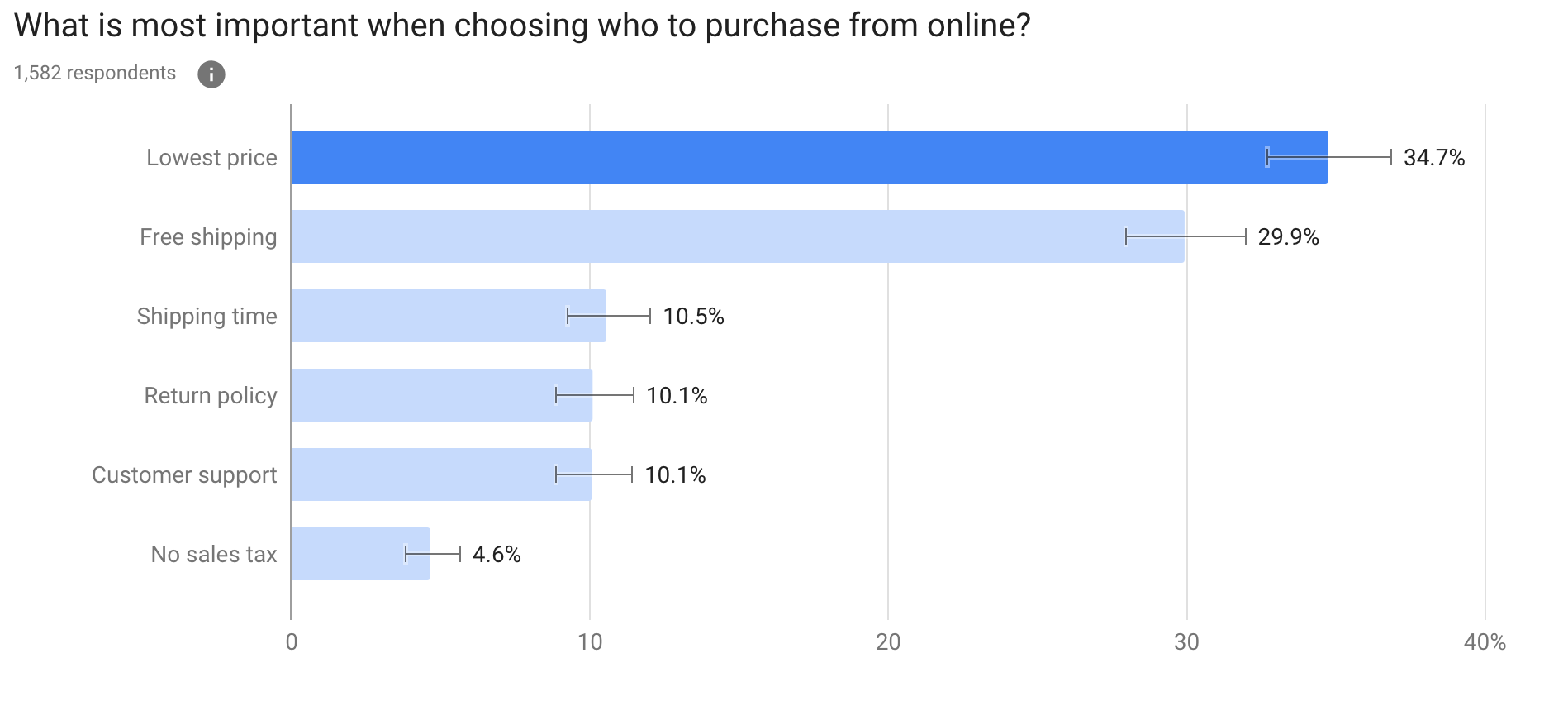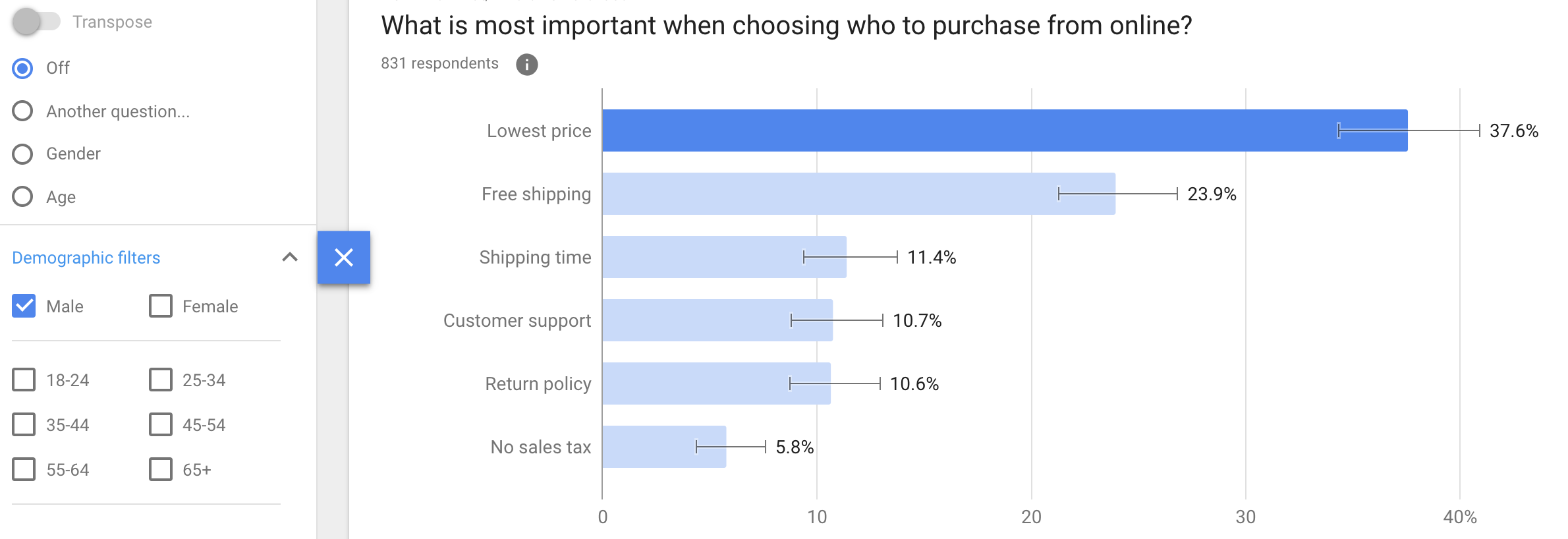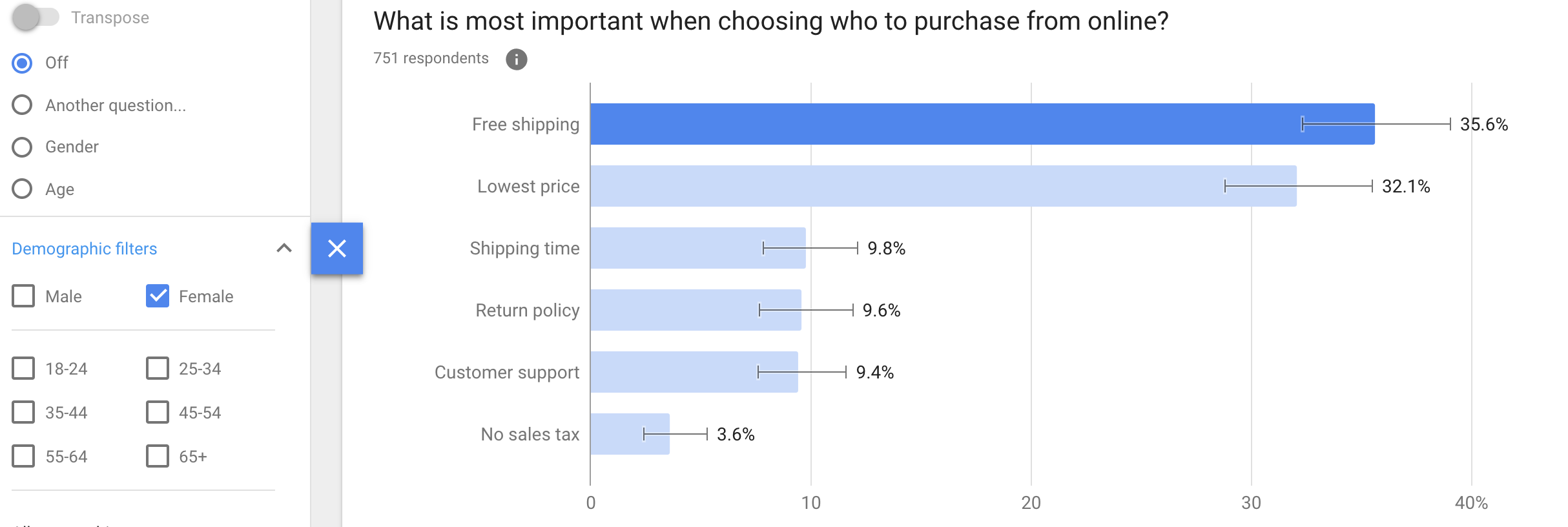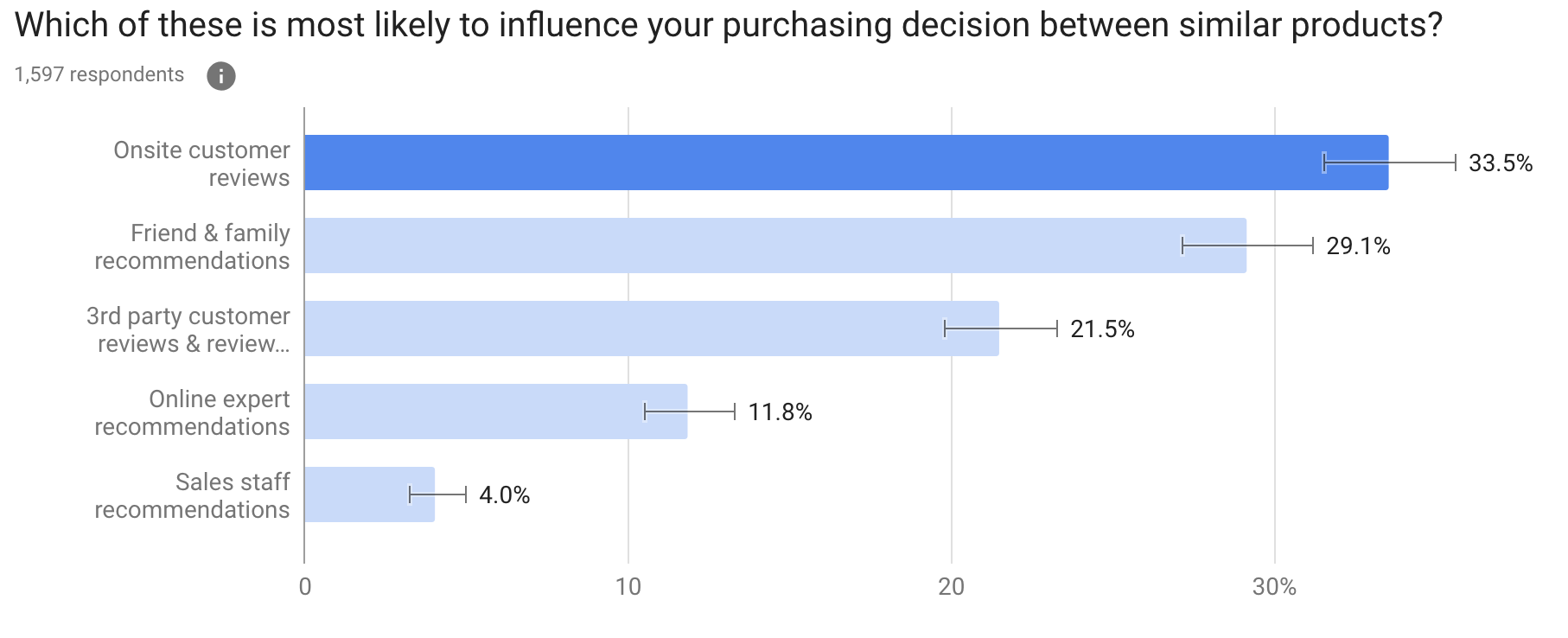Buyer Trust And Influence Study 2021
Understanding how customers trust the buying process is an essential component for any business. As online shopping shifts from desktop platforms to mobile devices, consumer interactions with their favorite brands are ripe for change.
Understanding how customers are influenced by online browsing habits of consumers as they research and purchase products can provide key insights into the digital infrastructure a business needs to properly support customer demand.
Table of Contents
- Summary of the Buyer Trust and Influence Study
- 1. Is it important for you to speak with a company over the phone before making an online purchase?
- 2. What is most important when choosing who to purchase from online?
- 3. When purchasing through online marketplaces (Amazon, Walmart, Jet, etc.) does it matter which vendor fulfills your order?
- 4. Which of these is most likely to influence your purchasing decision between similar products?
- 5. Do you typically trust online reviews?
Summary of the Buyer Trust and Influence Study
- 85% of consumers don’t think a phone call is necessary when purchasing online.
- A combination of free shipping and the lowest price will sway 65% of respondents into a buying decision.
- 38% of men view the lowest price as the most important factor when choosing who to purchase from online, compared to just 32% of women.
- 34% of consumers said that the vendor who fulfills their order mattered when they made an online purchase.
- While 34% of consumers are influenced by onsite customer reviews, only 22% are influenced by customer reviews found on 3rd party websites.
- 7 in 10 consumers trust online reviews.
- 74% of women trust online reviews, compared to 64% of men.
Questions:
Jump to the answer of a specific question by clicking a question below:
Trust & Selection
1. Is it important for you to speak with a company over the phone before making an online purchase?
2. What is most important when choosing who to purchase from online?
3. When purchasing through online marketplaces (Amazon, Walmart, Jet, etc.) does it matter which vendor fulfills your order?
4. Which of these is most likely to influence your purchasing decision between similar products?
5. Do you typically trust online reviews?
1. Is it important for you to speak with a company over the phone before making an online purchase?

Key Statistics
- 85% of consumers don’t think a phone call is necessary when purchasing online.
- 15% of respondents say that they want to talk to someone on the phone before making an online purchase.
Overwhelmingly, consumers don’t believe that it’s necessary to speak with a company on the phone before buying online.
This indicates that consumers planning to buy online expect all the information required to inform their purchase to be readily available to them through an online channel.
While it may be tempting to believe that 14.8% of individuals who say that it’s necessary are in older cohorts, our data suggest that these numbers are similar across all demographics.
Business owners entering the e-commerce market should be aware that consumers who lack the required information may not contact the company for additional discovery. They may simply move on to a competitor who offers the information they need and make their purchase elsewhere.
2. What is most important when choosing who to purchase from online?

Key Statistics:
- 35% of respondents said that price is the most important thing when choosing who to purchase from online.
- 30% of consumers view free shipping as the most important factor when choosing an online vendor.
- Lowest price is the most important thing for respondents when choosing who to purchase from online.
- A combination of free shipping and the lowest price will sway 65% of respondents into a buying decision.
- Only about 20% of online consumers said that services like return policies and customer support were a determining factor when choosing who to purchase from online.
- 1 out of 10 respondents views expedited shipping as a determining factor when choosing who to purchase from online.
While shopping based on price was the most common response (35%), nearly the same number of consumers (30%) said that free shipping was a major consideration when selecting a vendor during online purchases.
Based on our research, offering both the lowest price and free shipping resonates with a combined 65% of respondents.
It is feasible to conclude that a company may benefit by choosing the cheapest shipping option, rather than pay extra for fast shipping.
If competing on price is difficult, companies may also benefit from cutting costs on shipping, return policies, and customer service staff in favor of rock bottom pricing and free shipping due to buyer preference and broad market appeal.
Gender Demographic Highlights

Males: Men find lowest prices to be most important in choosing who to purchase from when shopping online.

Females: Females find free shipping to be most important in choosing who to purchase from when shopping online.
Key Statistics:
- 38% of men view the lowest price as the most important factor when choosing who to purchase from online, compared to just 32% of women.
- 35% of women consider free shipping as the most important factor when choosing who to purchase from online, while only 24% of men feel the same way.
- Men are most likely to view the lowest price as the most important factor when choosing who to purchase from online while women are more likely to view free shipping as most important.
According to our results, men and women have different views in terms of the factors involved when choosing who to purchase from.
The demographic breakdown provides huge opportunities for gender-targeted e-commerce businesses. While generating income based on the above data may still require some fine tuning, the roadmap is clear: Men prioritize the lowest price while women favor free shipping options.
From a strategic standpoint, the best option for online businesses targeting women is to offer free shipping. When targeting men, simply offer the lowest price.
Following these guidelines may create buying signals in the consumer shopping experience, which translates to greater long-term profitability.
3. When purchasing through online marketplaces (Amazon, Walmart, Jet, etc.) does it matter which vendor fulfills your order?

Key Statistics:
- 54% of consumers don’t care which vendor fulfills their online order when purchasing through online marketplaces.
- 34% of consumers said that the vendor who fulfills their order mattered when they made an online purchase.
- 13% of consumers aren’t familiar with how online marketplace vendor relationships work.
Online marketplaces have done a good job of making fulfillment partners follow the terms and conditions of the marketplace while also obfuscating the fact that shipment is fulfilled by a third party vendor.
As the data suggest: to a majority of shoppers, fulfillment logistics are not as important as final delivery.
If the product is sold at the advertised price and delivered in a timely manner, a majority of shoppers aren’t concerned about the original seller or how the product travels from its point of origin to their front door.
4. Which of these is most likely to influence your purchasing decision between similar products?

Key Statistics:
- 34% of respondents are most influenced by onsite customer reviews when purchasing similar products.
- Just 5% of consumers are influenced by sales staff recommendations.
- Online customer reviews have the greatest impact on consumer purchasing decisions.
- While 34% of consumers are influenced by onsite customer reviews, only 22% are influenced by customer reviews found on 3rd party websites.
- Companies are better served by prioritizing onsite reviews over 3rd party site reviews.
It’s hard to understate the importance of online reviews and their value to small businesses. Our data shows that business owners should focus on capturing onsite reviews rather than 3rd party reviews.
Focusing on onsite customer reviews using TrustPilot or Shopify would be more valuable than gathering reviews on Yelp, Google, or through the Better Business Bureau.
Onsite reviews are much more likely to influence consumers than outside sources, like expert recommendations or 3rd party review sites.
Our information also suggests that a business shouldn’t rely on its sales staff to be the final purchasing authority for any shopper and should instead prioritize customer testimonial feedback as an upward driver at key price points.
5. Do you typically trust online reviews?

Key Statistics:
- 7 in 10 consumers trust online reviews.
- 31% of consumers are skeptical of online reviews.
The importance of online reviews continues to grow as a buying signal for consumers in the digital space. Whether positive or negative, it’s safe to say that any review left online is considered persuasive and influential to a majority of potential shoppers.
According to our results, companies will be financially rewarded by investing in gathering online reviews for their businesses.
Business owners should have a solution in place to actively address low ratings and bad experiences in a timely and effective fashion.
Age Demographic Highlights

Age group 25-44: 76.7% of this age group trusts online reviews

Age group 45 and up: 63.3% of this age group trusts online reviews
Key Statistics:
- 76% of consumers under the age of 44 trust online reviews, compared to only 63% over 45.
- Consumers over 45 years old are more skeptical of online reviews than their younger counterparts.
- From a demographic standpoint, the willingness to trust online reviews seems to decrease with age.
- Younger consumers are more inclined to believe the authenticity of online reviews and consumer feedback.
When considering the demographic data surrounding online reviews, it’s easy to spot a 10% gap between the 45+ crowd and younger generations.
Trust in online reviews appears to follow a generational pattern, where younger consumers are more likely to trust online reviews. This could be due to greater familiarity with digital technology, which may evoke greater trust in the authenticity of the review.
Gender Demographic Highlights
 Male: 73.8% of men trust online reviews
Male: 73.8% of men trust online reviews
 Female: 64.2% of women trust online reviews
Female: 64.2% of women trust online reviews
Key Statistics
- 74% of women trust online reviews, compared to 64% of men.
- Males are more skeptical of online reviews than females.
- Across every age group and demographic, men are more inclined to distrust online reviews.
An analysis by gender provides additional insights into how men and women view online reviews.
While men are more skeptical than women when considering reviews, the majority of both genders consider reviews trustworthy.
Website purchasing experiences can vary wildly, and many convenient forms of payment have some measure of security baked in. However, if push comes to shove, consumers trend toward ease of use. E-commerce operators should do their best to ensure that their checkout experience is fast and easy while offering a wide variety of preferred payment methods during the transaction process.
Survey Methodology:
We surveyed 2387 people via an online publishing network in the United States. All gender and all ages represented.
Raw 2019 Buyer Behavior Study Data buyer behavior survey
See what you qualify for by answering some health questions.









